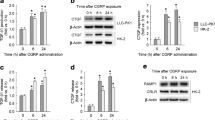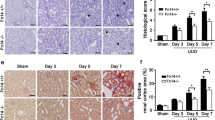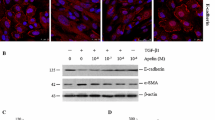Summary
In order to investigate the effects of connective tissue growth factor (CTGF) antisense oligodeoxynucleotide (ODN) on plasminogen activator inhibitor-1 (PAI-1) expression in renal tubular cells induced by transforming growth factor β1 (TGF-β1) and to explore the role of CTGF in the degradation of renal extracellular matrix (ECM), a human proximal tubular epithelial cell line (HKC) was cultured in vitro. Cationic lipid-mediated CTGF antisense ODN was transfected into HKC. After HKC were stimulated with TGF-β1 (5 μg/L), the mRNA level of PAI-1 was detected by RT-PCR. Intracellular PAI-1 protein synthesis was assessed by flow cytometry. The secreted PAI-1 in the media was determined by Western blot. The results showed that TGF-β1 could induce tubular CTGF and PAI-1 mRNA expression. The PAI-1 mRNA expression induced by TGF-β1 was significantly inhibited by CTGF antisense ODN. CTGF antisense ODN also inhibited intracellular PAI-1 protein synthesis and lowered the levels of PAI-1 protein secreted into the media. It was concluded that CTGF might play a crucial role in the degradation of excessive ECM during tubulointerstitial fibrosis, and blocking the biological effect of CTGF may be a novel way in preventing renal fibrosis.
Similar content being viewed by others
References
Eddy A A. Molecular basis of renal fibrosis. Pediatric Nephrology, 2000,15:290–302
Heidland A, Sebekova K, Paczek L et al. Renal fibrosis: Role of impaired proteolysis and potential therapeutic strategies. Kidney Int Suppl, 1997,62:s32–s35
Han D C, Hoffman B B, Hong S W et al. Therapy with antisense TGF-beta 1 oligodeoxynucleotides reduces kidney weight and matrix mRNA in diabetic mice. Am J Physiol Renal Physiol, 2000,278:F628–634
Huang H C, Min Y L, Li J Z et al. Comparative effect between Astrogalus-Angelica mixture and enalapril on expression of connective tissue growth factor in rats with renal tubulointerstitial fibrosis. Chin J Nephrol (Chinese), 2003,19:133–136
Bradham D M, Igarashi A, Potter R I et al. Connective tissue growth factor: a cystein-rich mitogen secreted by human vascular endothelial cells is related to the SRC-induced immediate early gene product CEF-10. J Cell Biol, 1991,114:1285–1294
Ito Y, Aten J, Bende R J et al. Expression of connective tissue growth factor in human renal fibrosis. Kidney Int, 1998,53:853–861
Grotendorst G R, Okochi H, Hagash N et al. A novel transforming growth factor β response element controls the expression of connective tissue growth factor gene. Cell Growth Differ, 1996,7:469–480
Yokoi H, Mukoyama M, Sugawara A et al. Role of connective tissue growth factor in fibronectin expression and tubulointerstitial fibrosis. Am J Physiol Renal Physiol, 2002,282:F933–F942
Badid C, Vincent M, Fouque D et al. Myofibroblast: a prognostic marker and target cell in progressive renal disease. Renal Fail, 2001,23:543–549
Wang S, Denichilo M, Brubaker C et al. Connective tissue growth factor in tubulointerstitial injury of diabetic nephropathy. Kidney Int, 2001,60:96–105
Wang S, Hirschberg R. BMP7 antagnized TGF-β-dependent fibrogenesis in mesangial cells. Am J Physiol Renal Physiol, 2003,284:F1006–F1013
Author information
Authors and Affiliations
Corresponding author
Additional information
ZHANG Chun, male, born in 1977, Associate Professor, M.D., Ph.D.
This project was supported by a grant from the Science & Technology Foundation of Hubei Province (No. 2003 AA 301C14).
Rights and permissions
About this article
Cite this article
Zhang, C., Zhu, Z., Liu, J. et al. Role of connective tissue growth factor in extracellular matrix degradation in renal tubular epithelial cells. J. Huazhong Univ. Sc. Technol. 27, 44–47 (2007). https://doi.org/10.1007/s11596-007-0113-2
Received:
Issue Date:
DOI: https://doi.org/10.1007/s11596-007-0113-2




